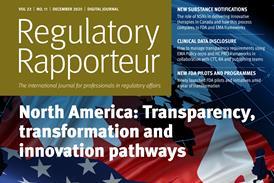All Focus articles
View all stories of the same content type.
-

-

-
 Focus
FocusHow data remediation and stewardship is becoming a standard responsibility for regulatory operations professionals
Data quality is becoming increasingly critical to the success of medicinal product applications and has the potential to increase the speed and efficiency of medicines supply to patients. There is an industry move towards a data-driven regulatory enterprise, highlighted particularly through the arrival of initiatives such as identification of medicinal products (IDMP), real world evidence (RWE), digital application dataset integration (DADI), electronic product information (ePI), marketing status (IRIS), US FDA knowledge-aided assessment and structured application (KASA) and eCTD 4.0, among others.
-
 Focus
FocusThe changing role of regulatory operations
The regulatory profession has always attracted diverse individuals with a wide range of professional experiences. Top talent has migrated from preclinical labs, clinical operations, quality, and a range of functions to pursue a career in regulatory operations. The role of the regulatory operations professional has and continues to evolve as the requirements for the position have changed drastically. These professionals have witnessed a substantial change in the responsibilities associated with their role. These changes are directly related to those in global submission requirements and associated standards, emerging technologies, and shift ing resourcing models, among other factors.
-

-
 Focus
FocusTranslating digitalisation trends into tangible solutions
Pharmaceutical companies are seeking to take advantage of digital innovations to become data-driven organisations, but rstly, they must overcome various data challenges to move from concept to execution. Timm Pauli, Head of R&D Informatics at PharmaLex, and Dr. Torsten Osthus, Advisory Consultant to PharmaLex and Managing Director of Osthus Group, (whose service division, Osthus Services, recently merged with PharmaLex), explore the path to successful R&D digitalisation.
-
 Focus
FocusData governance as a strategic imperative for regulatory compliance
Data governance is a multi-faceted arrangement that relies on data quality, data integrity, data and document management, security and safe storage. It is critically important to companies and regulators as they evaluate product quality, the manufacturing process and the reliability of study data from non-clinical and clinical research. The integrity ...
-
 Focus
FocusProcedure withdrawals within Europe: past trends, impact and communication recommendations
When an application for a new veterinary medicinal product (VMP) is submitted through a MR/DCP, the Applicant has the option to prematurely withdraw their application in the reference member state (RMS) or in one or several of the concerned member states (CMS). This would result in a total or partial withdrawal of the procedure. The Co-ordination Group for Mutual Recognition and Decentralised Procedures – Veterinary (CMDv) sent a questionnaire to all national competent authorities…
-
 Focus
FocusRegulatory Framework for Platform Technologies
Several novel manufacturing technologies and platforms, for example, messenger ribonucleic acid (mRNA) platform, synthetic DNA (doggybone (dbDNA)) platform, have recently emerged to produce vaccines and advanced therapy medicinal products (ATMPs) for human use. However, the regulatory framework for such platform technologies is not fully developed. There is significant interest in utilising platform approaches for drug development and for the commercial production of human medicines. Thus, some form of regulatory guidance and pathway, similar to the EU platform technology master le (PTMF) system that is used in the regulatory approval of veterinary vaccines, would benefit the human vaccines industry.
-
 Focus
FocusGene therapy products: regulatory expectations and challenges for industry
As the technology behind gene therapy products continues to evolve, applicants face the challenge of adapting their programmes to increasingly demanding and detailed regulation. This article provides an overview of current regulatory expectations and the challenges they may present to industry.
-
 Focus
FocusPractical insights into the recent EU MDR framework
This article focuses on the impact of the new guidance document on drug-device combination (DDC) products, in Article 117 of the European Medical Device Regulation (MDR) for pharmaceutical marketing authorisation holders (MAHs). It explores the new role of the notified body (NB) versus the MAH pertaining to the device part of the DDC, some of the pitfalls encountered by pharmaceutical MAHs and potential solutions to efficiently navigate the new framework. It also provides practical insights into key technical requirements for the product-specific quality aspects of a medical device, which are within the quality dossier of a successful EU application. The article also explores efficient global implementation within fast evolving and at times divergent, regional regulations.
-
 Focus
FocusThe EU restriction proposal for intentionally-added microplastics: A focus on solid dosage form medicinal products and food supplements
Among the European initiatives to address the growing concern of plastics in the environment, the European chemicals agency (ECHA) has prepared a restriction proposal for intentionally-added microplastics amid concerns about plastics in the environment. An introduction to the proposal and its impact on consumer products.
-
 Focus
FocusTerrestrial ecotoxicological studies for veterinary pharmaceuticals in livestock dung in the field: Phase II Tier A and beyond
The environmental risk from veterinary pharmaceuticals (VPs), which are usually called veterinary medical products (VMPs) must be assessed according to European legislation: in particular, parasiticides that are used for pastured animals (eg, sheep, cattle etc). This is especially true regarding the non-target effects of faecal residues on dung-dwelling organisms. Focusing ...
-
 Focus
FocusRegulating medicines in a surge of change
RegRap speaks to Steve Hoare, Quality Regulatory Science and Safety Policy Director at the ABPI
-
 Focus
FocusThe impact of the Northern Ireland Protocol on human medicines
Since the UK’s exit from the EU, the pharmaceutical industry has sought guidance on how this would impact the registration and supply of medicines, both in the UK and the EU. In addition, the publication of the Northern Ireland Protocol has added additional complexities, with a major impact on the ...
-
 Focus
FocusBrexit − Regulatory and supply chain considerations
The UK formally left the EU on 31 January 2020 and the transition period, as set out in the withdrawal agreement, came to an end on 31 December 2020. During this transition period, the UK continued to remain under EU pharmaceutical law. From 1 January 2021, the UK adopted an ...
-
 Focus
FocusPharmacovigilance regulations post-Brexit
The UK (Great Britain and Northern Ireland) has left the EU and the Brexit transition period has passed. This article covers points to consider when ensuring that pharmacovigilance systems for human medicinal products are compliant with EU and UK requirements. The UK requirements largely mirror the existing EU pharmacovigilance (PV) ...
-
 Focus
FocusTime is running out for the rare pediatric disease designation and priority review voucher programs
Since 2012, the rare paediatric disease priority review voucher (RPD PRV) program in the US, provides incentives to promote research in leftover orphan paediatric disease...
-
 Focus
FocusNew regulatory tools for drug developers: sharing experience
Advances of knowledge in therapeutic areas have led an ease in the development of and access to complex medicinal products. This article discusses the regulatory tools in drug development and regulatory science for drug developers.
-
 Focus
FocusConditional oncology drug approvals: A sponsor’s perspective on the evolving landscape of FDA accelerated approvals
The FDA’s accelerated approval (AA) pathway is an important regulatory mechanism that allows patients with serious or life-threatening conditions, potentially earlier access to treatments than under a standard, regular approval development pathway...



















